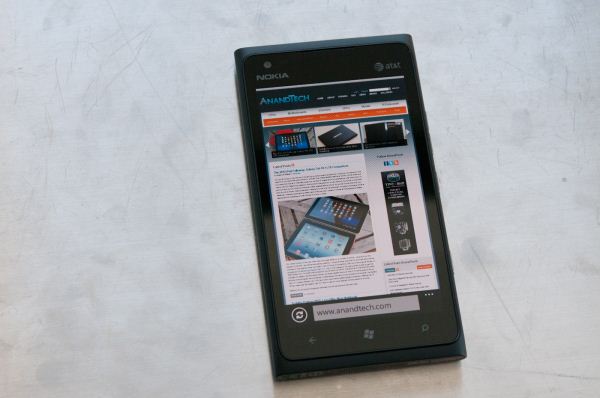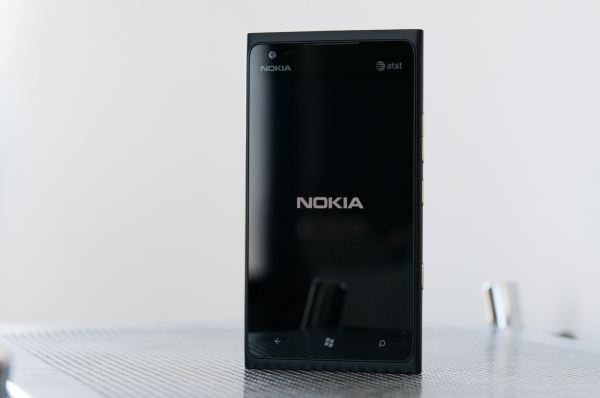Nokia Lumia 900 Review - Windows Phone with LTE
by Brian Klug on April 3, 2012 9:00 PM ESTSumming up the Lumia 900 as a device is pretty easy, it's superficially a beefed up, larger Lumia 800. Spelled out explicitly, the changes are a larger 4.3" SAMOLED+ display with a full RGB stripe, a front facing 720p camera, and LTE connectivity for AT&T. When it launches later in Europe, instead of LTE, the Lumia 900 will bring DC-HSPA+ and all around improved cellular connectivity courtesy MDM9200. The Lumia 900 is thinner, but obviously larger in x and y to accommodate the larger display, but in the hand and pocket the difference isn't all that huge. The end result is a device I can find only positive things to talk about with, and it's the Lumia that finally rounds out Nokia's complete entrant Windows Phone lineup.
For the first time in a while, I'm genuinely excited by a new Windows Phone. With the Lumia 900, it seems as though some of Nokia's rhetoric about being the first OEM to put its best hardware and design forward with the platform is starting to ring true. Similar to our take on the first members of the Lumia family, the 900 is easily the best Windows Phone on the market today.
The $99 launch price is absolutely crazy and very welcome for a flagship phone, particularly one with such high build quality and camera standards. Not only does this obviate other Windows Phones, but it increases competitive pressure on Apple as well as Android smartphone providers. I don't know that there's still a lot of iPhone/Windows Phone cross shopping, but a trend towards even cheaper on-contract prices for high-end smartphones is absolutely welcome.
What we really need to see from Nokia is faster hardware and more power efficient LTE, both of these things are technically possible today (28nm LTE basebands are still not quite available in volume yet) however it's up to Microsoft to actually enforce the platform change. It's amazing what Nokia has been able to do hardware-wise with only a year in the Microsoft camp, particularly when you remember that most smartphone development cycles are in the 12 - 24 month range. While the Lumia 900 is a great Windows Phone today, what will really be interesting is what Nokia will be able to pull off with a full design cycle under its belt.
The Lumia 900 launch in the US is, like I stated before, obviously a big deal for Nokia, and putting its best devices on the table with the 900 makes sense, even if the initial Lumia 710 introduction was something of a puzzling first step. While it's a big deal for Nokia to be launching a flagship phone in the US once more, it really isn't as much of a make or break thing for the Windows Phone 7 platform in general, and that brings me to my next point.
Ultimately the Lumia 900 doesn't really change the balance of power in the smartphone OS competition as it stands right now. Although the version number has advanced on the Lumia 900 (because of changes that needed to accommodate LTE), it's really the same Windows Phone 7.5 Mango we've seen and talked about before. If you're looking for a make or break launch that might upset the balance, wait for the Apollo update.
As it enables dual-core SoCs, the Apollo update leads to our continued plea to Microsoft: please throw better hardware at the Windows Phone platform. No company ever won by being the slowest. Windows Phone may be an extremely efficient platform (it is), but there are only good things to come from combining software efficiency with bleeding edge hardware. Microsoft has learned tremendously from Apple in this regard, but in order for Windows Phone to be more than a third runner up it needs to push the envelope just as much as Apple has been. Microsoft will eventually adopt Krait, and 28nm LTE is equally inevitable, but it would just be nice to see those things sooner rather than later on Windows Phone. At some point for a platform to be a winner, it must actually be industry leading. I suspect all of this will come as a part of Microsoft's Windows 8 strategy. Waiting is never easy.












128 Comments
View All Comments
BabelHuber - Wednesday, April 4, 2012 - link
---> Can be used like a USB-stick. No iTunes/ Zune needed. Simply plug your phone into your PC and use the Explorer you like--> I can connect USB-harddiscs to my Asus TF Prime. Like in Windows, I can messs around with a file explorer there
--> File explorer: Android has a real Linux file system. You can handle files like you have always done with computers. Hence cloud-services are not mandatory.
--> Supports SD cards including full access via file explorer
--> Allows installation of apps that were not downloaded via Google Play/ market. You can install whatever you want
--> Real multitasking
--> Allows tweaking: I have e.g. installed the rSAp-functionality on my Android phone last weekend:
I have installed new system libraries, maually replaced system files etc. to get it work.
It was a lot of effort, but at least I could do it. My warranty is gone now, though.
To sum it up: Android is like a real Personal Computer. You can do whatever you want with it, there are no restrictions whatsoever.
As a downside, you can mess up your phone completely, too. But this is the price of freedom
steven75 - Wednesday, April 4, 2012 - link
Ah so all things 99% of the market doesn't need or want. Gotcha!eddman - Wednesday, April 4, 2012 - link
iphone does not support them and still sells millions. Most people don't care about those features on a phone.ol1bit - Wednesday, April 4, 2012 - link
I do, and I know lots of others who like that as well, otherwise, why have a smart phone?eddman - Wednesday, April 4, 2012 - link
I said most, not all. Obviously for users who want those features, android is the only choice.I'm just saying that the lack of those features won't necessarily impact the sales, judging from how well iphones sold and keep selling.
BabelHuber - Thursday, April 5, 2012 - link
Well, from my experience some iOS-users don't even know that functionality is missing.When I quickly use my phone as USB-stick to transmit data from one notebook to another, they even are surprised (and yes, such things don't occur often, but sometimes this comes in handy)
Or when I browse my files using an actual browser, they are surprised that I don't have to open an App first.
Some users are so locked into the Apple ecosystem that they don't even expect their smartphone to act as a small PC, even though it is one.
They act as if their phone was a fixed-function-device because of technical limitations, not because openness was omitted on purpose by the manufacturer.
Xale - Friday, April 6, 2012 - link
Humerously, those aren't even Android features, but Feature Phone (Dumbphone) features.Stuff that could be done a decade ago.
TGressus - Thursday, April 5, 2012 - link
why indeed?It seems like a more powerful tablet experience would serve folks better. Then the phone can go back to being a sleek and inexpensive afterthought.
What it's going to take to get there is a better tablet OS. MS is poised to bring it first, which I don't think many saw coming.
tipoo - Wednesday, April 4, 2012 - link
Its almost funny how close to Windows vs OSX vs Linux this has become. Android gives you by a landslide the most options, iOS has a great user experience but cages advanced users in a bit too much, WP7 is somewhere in the middle on both fronts.WP7 seems to trade off absolute speed for smoothness. Looking at the browser synthetic benchmarks its much slower than even old single core Android or iOS phones, but what reviews can't show you is how well it lets you navigate pages during that loading time.
Braumin - Wednesday, April 4, 2012 - link
Actually they don't show load times, every site on the earth focuses on javascript as the be all and end all for web browsing.